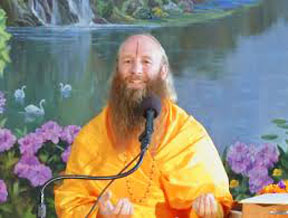
Continuing from the discussion in the previous article, let us under stand the three kinds of evidence that can be used to prove the existence of God, similar to the scientific field. As described in the last article, the first kind of evidence is knows as Perceptual Evidence (Pratyaksh Praman) which is based on direct perception.
The second one is called Testimonial evidence (Shabd Praman) is provided by those qualified individuals who have had the direct experience of God (Pratyaksh Praman). We call them God realized Saints. The third kind of evidence is known as Inferential Evidence (Anuman Praman) is provided by the Vedas and other scriptures which logically explain the rationale behind God’s existence.
For example, the following logical argument is made: would anyone look at a watch and believe it could come into being on its own? When something as simple as a watch requires an intelligent being for its creation, then how could one think that this amazing universe, full of unlimited complexities and variations stretching up to an unknown limit and yet regulated in a systematic and orderly way, could have come into being on its own? Thus, even without Pratyaksh Praman, we can deduce or infer the existence of God due to the assumed necessity of an all-knowing and all-powerful being behind the existence of the universe.
Looking at a map of the world, would anyone believe that this representation of the earth could have come into being in a random, accidental way, or could have created itself? If the creation of a mere map of the world requires a maker, then how could we think that the world itself could have come into existence without a maker? These are examples of Anuman Praman, which uses logical arguments to deduce the existence of God.
One may wonder as to why we cannot see God now? Why can we not have Pratyaksh Praman of God’s existence immediately? The reason is that in order to see God, you need to have Divine eyes. In order to hear God, you need to have Divine ears. Divine God can only be perceived with Divine senses. Divine God can only be known with a Divine mind.
Our senses and mind are material, thus they relate to the material world. With material senses, we can only perceive material things and that too within certain limitations. We can only see to a certain distance and to a certain limit of subtlety. We can only perceive certain electromagnetic wavelengths. We can only hear certain wavelengths of sound waves and only above a certain decibel level.
Thus, even within the material phenomenon we can only perceive within certain limitations, and anything beyond that is beyond our perception. Then how could our senses perceive God, Who is by definition Divine and all-together beyond the material phenomenon?
How could our limited senses perceive unlimited God? How could our limited material mind, which struggles to grasp material concepts and which has barely scratched the surface in understanding the mysteries of the material universe, hope to know Divine, unlimited God, Who is the original cause of the universe and Who exists absolutely beyond the universe?
The answer given by the Vedas is that through God’s grace, one can receive Divine senses and mind and with these Divine faculties one can experience God directly, just as we currently experience and interact with the material world directly. Once we have received Divine senses and mind, we can see and know God and we will have gotten the Pratyaksh Praman of God’s existence.
However, in order to reach that level of experience, we must become qualified by following the path to God. To do that, we have to start with faith in God based on the testimonial and inferential evidence provided by the scriptures and God realized Saints.
If someone has never been to Switzerland and verified its existence with their own eyes, then they have no Pratyaksh Praman of the existence of that country. Does that mean it is irrational or unscientific for them to believe that Switzerland exists? On the contrary, most people would feel it is illogical of them not to accept the existence of Switzerland. Why, when they have no perceptual evidence? Because the existence of Switzerland is documented in every Geography and History textbook (testimonial evidence) and also corroborated by millions of people who have visited there and also testified to its existence.
In the face of such overwhelming Shabd Praman, a person generally accepts the existence of the thing even though they lack the direct experience of that thing. In other words, they have faith. Similarly, we are faced with an overwhelming amount of testimonial evidence for God’s existence provided by the Vedas, other scriptures, and by God realized Saints. Choosing to believe in God based on this is indeed logical and scientific.
Moreover, if someone still refuses to believe in the existence of Switzerland despite all the Shabd Praman, then what will those who have actually been there and seen it say? They can only say, “It exists. I have seen it. You can also see it, but you have to go there yourself. I can show you the way. But if you both refuse to take my word for it and also refuse to go and see for yourself, then I cannot help you.”
Similarly, if one will neither accept the Shabd Praman for God’s existence, nor follow the path to God to become qualified for the direct experience oneself, then that person is like someone who says, “All you so-called scientists are lying about the existence of atoms.
It is a big conspiracy to get me to believe in something that does not exist.” And the scientists say, “Please perform this experiment and you will see for yourself.” But the non-believer says, “I will neither perform the experiment, nor will I take your word for it. This is all a big hoax.” Then the scientists will have to leave that person to his own imaginary thoughts.
Thus, we see that there is a logical basis for believing in God, and having faith in God is not an “unscientific” or irrational thing to do. You can both believe in science and believe in God. Believing in one does not exclude you from believing in the other. Any valid scientific conclusion can be rigorously tested and verified over and over again, and an experiment, if properly performed will continue to give the same result again and again.
Similarly, the means of attaining God has been authenticated by millions of souls who succeeded in becoming God realized. They all confirmed that God is perceivable with Divine senses and mind, is the very form of absolute bliss and knowledge, and that by attaining Him, they also became all-blissful and all-knowledgeable.
Disciple of Jagadguru Shree Kripaluji Maharaj
Swami Nikhilanand Ji is a Canadian born Hindu spiritual leader based in Austin, Texas. He is a sanyasi disciple and pracharak of Jagadguru Shree Kripaluji Maharaj.
Attracted to the teachings of Hinduism from a young age, Swamiji eventually let his deep spiritual longing lead him to India, where he was most fortunate to come under the guidance of Shree Kripaluji Maharaj. Thereafter, living in the ashrams of JKP, he extensively studied Hindi, the philosophy of the prime Sanskrit scriptures (Vedas, Darshan Shastras, Gita, Bhagwatam), and practiced meditation in the tradition of raganuga bhakti. In 2003, he was given sanyas. Now, with the blessings of his Guruji, he offers satsang programs throughout America, engaging audiences with his clear explanations of Hindu philosophy coupled with inspired chanting of Sanskrit mantras and shlokas and charming nam sankirtan.
His informative and compelling speeches provide practical insight into how to adopt the teachings of Sanatan Dharm into our daily lives, and inspire us to awaken our inner spiritual potential.
To stay in touch with Swami Nikhilanand Ji, like his Facebook page at https://www.facebook.com/SwamiNikhilanand or follow him on twitter at https://twitter.com/Swami_Nikhil.
Swami Nikhilanand






